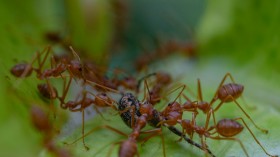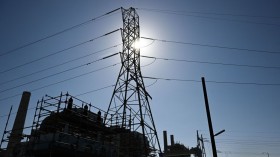Recruiting willing citizen scientists to count craters on the moon yields results just as accurate as employing professionals with years of experience doing the task, according to a new study from the University of Colorado, Boulder.
Researchers report that a crowdsourced group of volunteers who were asked to examine an image of the lunar surface taken by NASA were able to come up with accurate counts of individual craters, even though they lacked the experience of professional crater counters.
The study comprised the work of eight professional planetary crater counters with 5 to 50 years of experience and the results of several thousand crowdsourced volunteers.
"The new research points out that crowdsourcing is a viable way to do planetary science," said Stuart Robbins, a research scientist at CU-Boulder's Laboratory for Atmospheric and Space Physics. Robbins led the study, which is published in the journal Icarus.
"What we can say is that a very large group of volunteers was able to chart these features on the moon just as well as professional researchers," Robbins said in a statement. "More importantly, we now have evidence that we can use the power of crowdsourcing to gather more reliable data from the moon than we ever thought was possible before."
Robbins said that lunar craters are important to study because they serve as a record of cosmic mayhem that went on during the early formation of the solar system.
"The early solar system bombardment recorded on the lunar surface allows scientists to look backward in time to see the conditions early Earth likely endured," said Robbins. "As scientists, we not only want to know what events happened, but when."
The volunteers were recruited through CosmoQuest, a citizen science Web project that invites people to count celestial craters. CosmosQuest was developed by study co-author Pamela Gay of Southern Illinois University, Edwardsville.
The researchers were able to verify the accuracy of the volunteer crater counters, an important step towards toward legitimizing the citizen science and crowdsourcing movement.
"Without this first step of verifying the accuracy of volunteer crater counters, there would be no point in continuing the project. Our study results mean we can now use the power of crowdsourcing to gather more data than we ever thought possible before."
Robbins said that with an army of volunteers to spend time counting craters, scientists can spend time delving into a deeper understanding of our solar system.
© 2024 NatureWorldNews.com All rights reserved. Do not reproduce without permission.

![Extreme Heat Wave in Africa’s Sahel Region That Killed 100 People Linked to Climate Change [Study]](https://1471793142.rsc.cdn77.org/data/thumbs/full/70226/280/157/50/40/extreme-heat-wave-in-africa-s-sahel-region-that-killed-100-people-linked-to-climate-change-study.jpg)


![US Thunderstorm Forecast: Southeast at Risk of Strong Winds and Hail This Weekend [NWS]](https://1471793142.rsc.cdn77.org/data/thumbs/full/70225/280/157/50/40/us-thunderstorm-forecast-southeast-at-risk-of-strong-winds-and-hail-this-weekend-nws.jpg)
